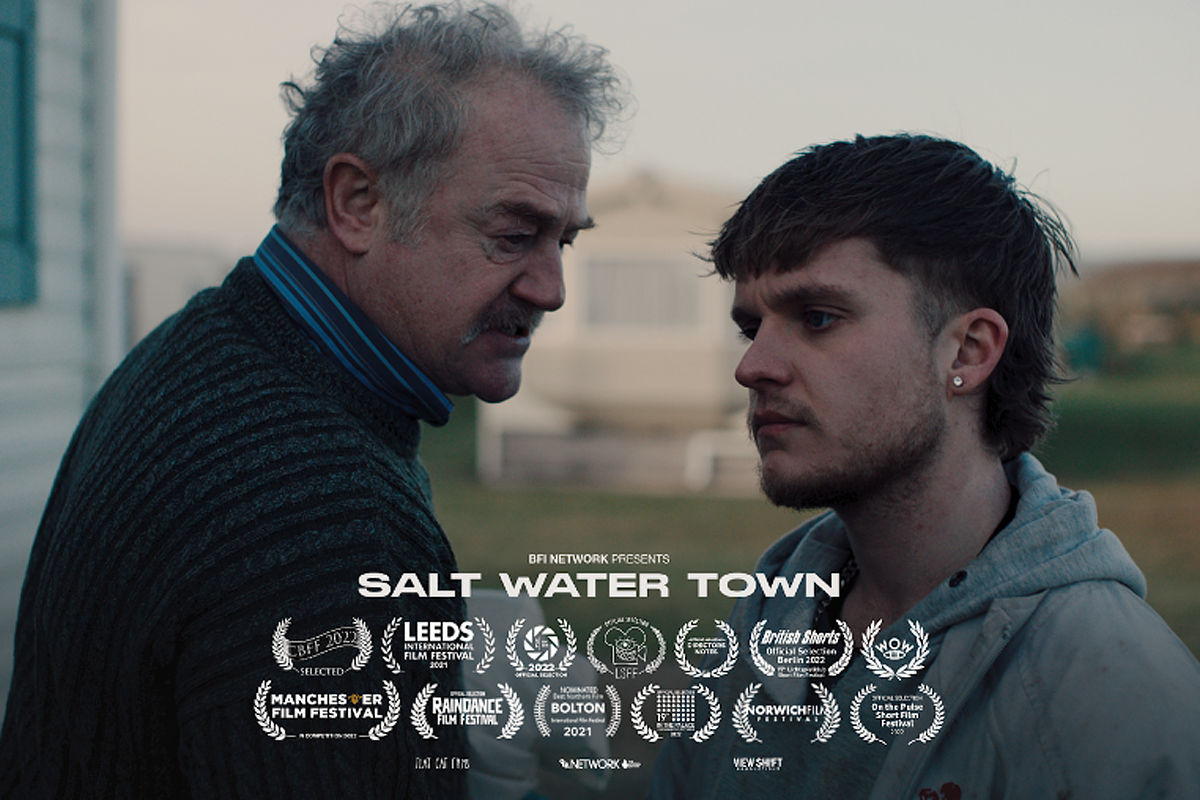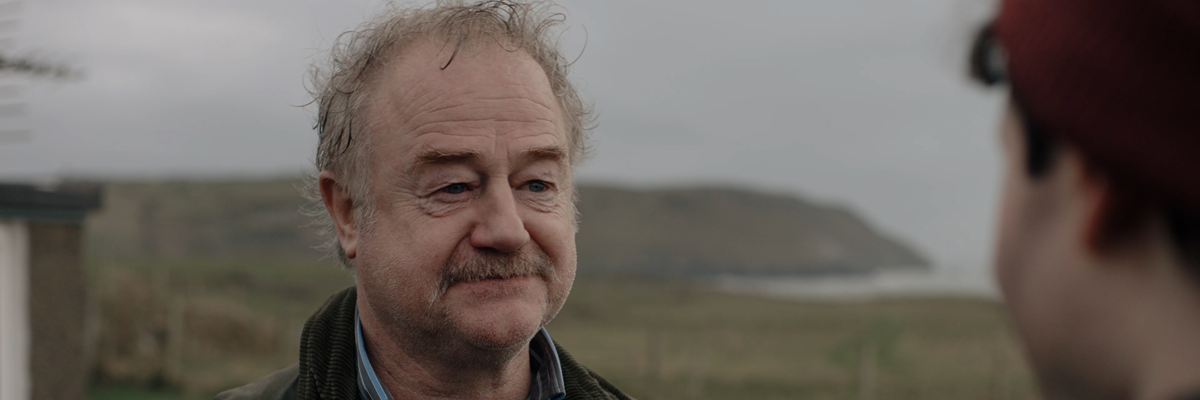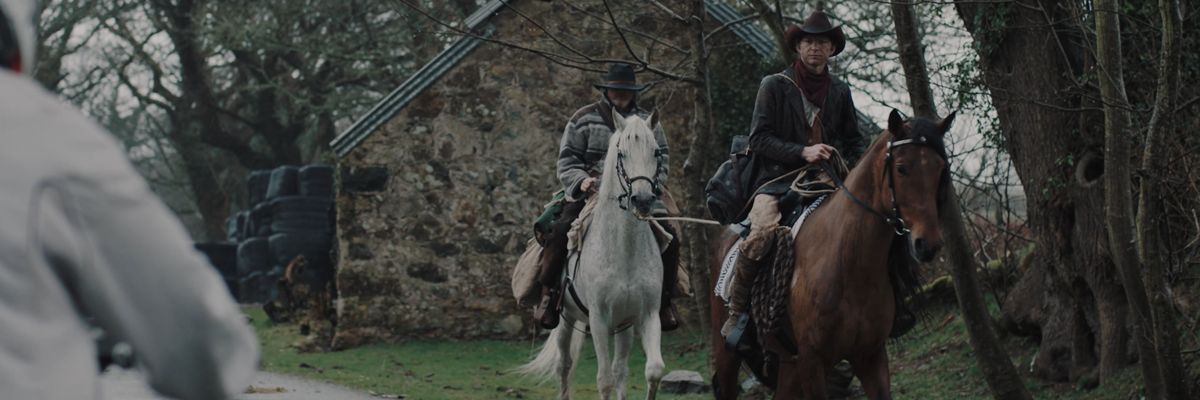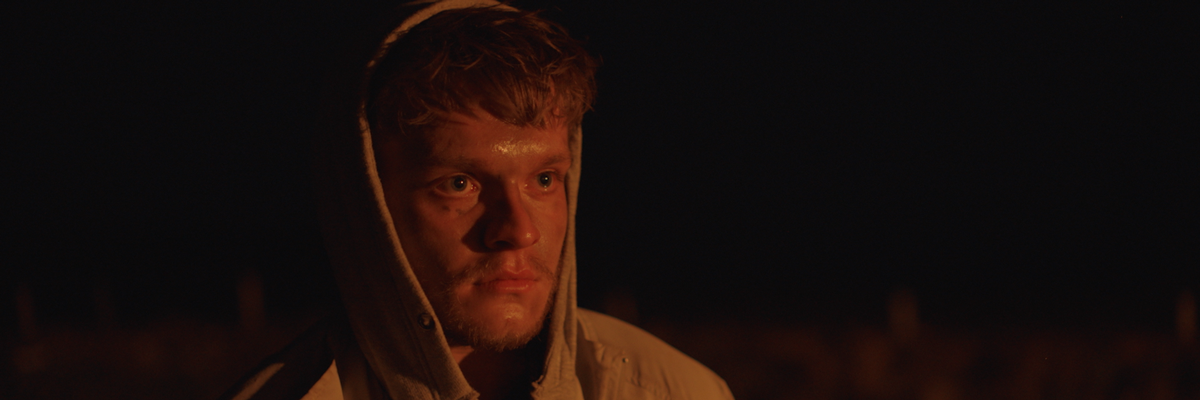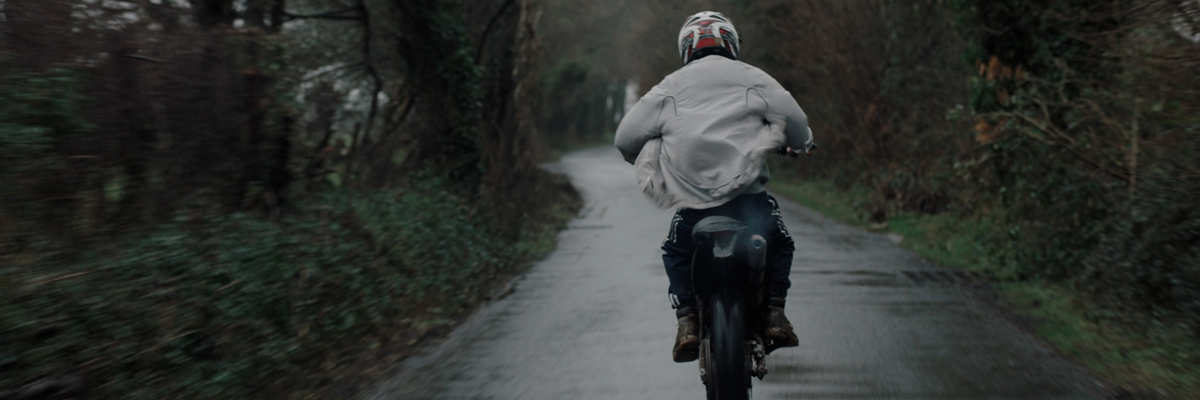Director Dan Thorburn talk to us about making SALT WATER TOWN and using it as a vehicle to explore toxic masculinity, climate change and rural poverty.
Co-writers
Jack Sherratt and
Dan Thorburn were keen to continue exploring toxic masculinity and highlight issues of rural poverty after wrapping up their first short film,
Trucker’s Atlas, which led them to creating the world
Salt Water Town. Supported by Film Hub North through the BFI NETWORK Short Film Fund, this short film centres around a father and son who wrestle over the future of their failing caravan park in a poverty-stricken coastal town.
Having had quite a good festival run since it premiered back in 2021 and winning awards such as Best Northern Short (Wigan and Leigh Film Festival) and Best UK Short (Little Wing Film Festival) along the way, we spoke with writer-director Dan Thorburn about the inspiration behind Salt Water Town, how the team achieved the iconic scene when everything goes up in flames and more.
Dan Thorburn is an award winning writer and director from the North of England. Originally a painter, he studied at Central Saint Martins School of Art in London where he transitioned his practice into film. He has directed a range of successful drama (Salt Water Town, Trucker’s Atlas), gaining recognition from festivals world wide and received consistent funding from the British Film Institute. Alongside his arthouse social realism work his portfolio also expands to contemporary dance film. He currently has two feature films in development and is working as co-creator on a coming of age television drama.
Let's get started at the beginning - what sparked the idea for Salt Water Town?
After working on Trucker's Atlas, we wanted to push our exploration of toxic masculinity a bit further whilst delving into slightly different topics and spaces. I'd been saying to Jack for a while, and to anyone who'd listen, that I'd really love to make a story on a caravan site in North Wales. My grandpa had a caravan and my family and I'd go for weeks at a time for family holidays and it was always great fun. And Jack did something really similar. And one thing we noticed, as we've kept going back, was that these places never really changed, which is super interesting. We've always been intrigued by locations that are locked in time and slowly experience rural poverty.
Then Jack happened upon a BBC article about a town in the middle of Wales, called Fairbourne. Their sea walls have been continuously breached, to the point that the government can no longer fund the sea defences for the town. And whilst there’s no imminent threat, within the next 40-50 years or so, that town probably won't exist anymore as it's super low lying. Straight away Jack, who is a huge advocate for environmental issues, goes, ‘that's very interesting!’ And so we coupled that low lying, imminent environmental threat in the background with current, pressing issues of trapped youth in these areas, and the feelings of anger that comes with that to create Salt Water Town.
How did Salt Water Town evolve from that initial news article, and passion from you both, into a story centering on a father and son who find themselves at a point where climate change, toxic masculinity and poverty intersect in a caravan park in a Welsh coastal town?
We wanted to take a closer look at generational differences in that kind of setting; you've got people who want to get out and those who feel trapped in these places. And whenever we went to these towns or spoke to anyone who's from there, including people we knew or met along the journey, all they’d done is grown up with a view to get out as quickly as they could. Then of course you end up with a massively ageing population who are kind of struggling to maintain things on their own with a limited number of jobs available and a small tourism industry.
Drawing a comparison between young people who want to get out and do something with their lives, and an older generation of people who are very kind of “why would we leave on a run away from a fight?”, led us very quickly into what you see as manhood a lot of the time: “I'm a young man, I can take control, I'm gonna get out of here” versus “No, I'm older, I've been here forever. I'm going to run this wee caravan park”.
There’s a scene where Owen’s down on the beach, looking at the ocean coming closer and closer - one thing he definitely can't fix, especially not on his own. And I think that clash between fathers and sons is always kind of a big battle that we see throughout life: the point where a father needs to understand that their son probably is stronger, quicker, maybe has more fresh ideas. And it’s this clash of opposing views that builds tension in the story whilst the climate change issues just sit underneath as a kind of catalyst for that.
What was it like working with Owen Teale and Tom Glynn-Carney to bring those characters to life and explore the generational differences in this particular world that you've created?
It was such a pleasure to work with Owen and Tommy. We worked with a really great casting director, Sydney, who put a few names together. Owen was always top of my list because I said to her Welsh talent is gonna make the film especially because hopefully those actors will resonate and connect with the story which Owen did. He said not only did he love the story, but it really spoke to him as a Welshman who left the place he comes from and seen those smaller towns suffer their way through a lot of this kind of rural poverty and try to keep up with a lot of change in the UK.
And then with Tommy, the only question we had was could he do a Welsh accent. We got in touch with Tommy's agent who said, ‘Yeah, Tom can do a Welsh accent’. And then apparently Tommy got a phone call saying, ‘You're gonna do a Welsh accent’ and Tommy's like, ‘Am I?’. ‘Yeah, you better start learning’. Fortunately, he absolutely nailed the accent and he's perfect. And the amount of people that have asked me if they are both Welsh… we were like it’s perfect, couldn't have gone any better.
But really working with those guys was fantastic, they've got so much energy about them and work in different ways which really complemented the characters they played. Jack did a fantastic job of getting, you know, real people down on paper, but then working with those guys where they can just scoop up
our script and turn it into something different was fantastic.
In the final moments of the film, the situation escalates, and things literally go up in flames. Can you walk us through how the team prepped for and then shot that scene?
We couldn't afford all the crazy things we looked into but the main crux of it came down to our editor Dom Old. Without him and many painstaking hours of teaching himself how to create these fire assets, we just wouldn't have the climax of the film. I remember the first time I saw it I was like, ‘Bloody hell, that's impressive’, because there was a lot of faith put into us.
And this is something Owen spoke about when we're shooting those final scenes. They had to really trust this was going to work. Owen did a fantastic job and you know, it was hard work on my part as well to really get us into that mindframe that this caravan park was on fire and Owen needed to get that family out there. And I think it’s a testimony to him and to the crew for making him believe that this was going to work. And the same for Tommy, the performances at the end are heartbreaking and fantastic and coupled with what Dom managed to do was brilliant.
In terms of on set, all the smoke you see is practical, and there's a lot of lights there which were all practical. It was the last thing we shot and in the middle of the night. We had everyone there with fans, smoke and lights and it kind of felt like we're conducting some sort of ballet - everyone had to be doing exactly the right thing at the same time if not all the smoke would be blowing back in your face or disappear over the hills. It all came down to just having fantastic crew who were all happy to just muck in.
Were there any key challenges that you faced during the production of Salt Water Town and how did you overcome them?
So the big one that everyone will probably always talk about is COVID because it was scary as hell. However, it also made it a lot easier for us in some ways because we had access to crew, an entire caravan park that should have been filled with residents and holidaymakers, and basically the entirety of the coast of Wales because people weren't allowed to travel for the holidays.
But I think the biggest thing was really just the fact that we were making a film that was two and a half hours away from Manchester and then finding the location itself. You’d have thought finding a caravan park on the coast of North Wales would be really easy but we literally drove the entire coastline because we needed somewhere that was small and believable enough that kind of fit this world as we don't really spend much time outside of it. I think that was quite a big difficulty for production. That and sourcing the amount of stuff I was asking for: horses in western saddles, cowboys in costume, wanting a motorbike to ride past them and that being filmed with a camera car; and Sarah, our producer, just nodding and going, ‘Right, okay’, disappearing and then coming back and putting it together. It was marvellous that she managed to do it with such a limited budget. And it was also fantastic having Harris Tomlinson Spence from View Shift jump on board later on as our Associate Producer to further support the production.
What is one of your favourite moments from the shoot?
Ok, there are a few. There's turning up on the first day. We arrived at one of our farm locations and there's like motorbikes being ridden past, quad bikes dragging things up there to set this up, there's a guy rigging up this huge camera car sorting, there's like horse trailers and stuff and, I remember seeing it all and being like, ‘Oh my God, have we done this? Like, this is outrageous’ to our producer, Sarah. Because for Truckers Atlas, all we had to have was like a few of us in the woods with a big ladder. This is like a whole other world.
And then doing the camera car stuff. And it's a shame we didn't have a BTS photographer that day because we had a full camera car tracking vehicle with a massive big blackout of the car with a camera mounted to it. We went up and down this country road that we'd shut off following this motorbike or sometimes we were towing the bike with Tommy on it and stuff like that. That was a bonkers one because the next few days were focused on the actual performances and getting all that stuff nailed. And by the time we finished, I couldn't even remember the camera stuff.
And finally, meeting Owen and Tommy and making some really good friends on set. It was really good fun to make those connections and make those friendships.
So you've had quite the festival run with this film. And now it's available to watch on Omeletto. How has that journey been?
The journey’s been fantastic. We've been really pleased with how the film's been received, especially in the UK, which is where because we always knew the target audience would resonate most with the story. We played at Raindance, Bolton International Film Festival, Leeds International Film Festival, London Short Film Festival, Norwich, and Wales International Film Fest to name a few. And we always try to make the most of our festival run and get to these places as it’s great being there in person, especially coming out of the pandemic, and network and do a few Q&A's and stuff. That was really good fun.
But we're really excited to have the film online. A lot of festivals now don't mind so much if your film’s already been released online. I think it's just something that we're always aware to be careful of. But everyone always wants to see your work and as soon as you start promoting it at festivals, you know, some people make it. So getting it online has been really exciting. And working with Omeleto has been great. They've got millions of viewers across their different platforms so that's going to be a really cool way to get the film out there.
Speaking of which, View Shift has been leading our social media campaigns and they've done such a great job getting the word out there. So yeah, it's been a really cool festival journey - we’ve met some amazing people and hope to continue and that the film finds an audience online as well.
After the iconic last scene, we're glad that this isn't the end for Salt Water Town. What has the process been like developing it into a feature as part of the BFI Early Development Fund?
A number of people I’ve spoken to have been like, and then what? What else is there? And we’re like, you know, there's no more to this story, we ended up where we ended up but people loved the world that we've made. So that is something we definitely want to continue exploring - climate change and regional areas - and turning what comes out of that into a feature length film with a cinematic release would really resonate with an audience that you just can't reach from short films.
For our feature, we're exploring Morecambe, which is a great place and hasn't been explored much in film which is gonna be really exciting. We’re also looking at a similar story of generational difference this time between two brothers and their mom and the way in which we kind of see escapism versus staying where you are and trusting your roots and looking kind of in on your own community. It's been fantastic to keep some of the stuff that we liked in Salt Water Town but just push it way further. And having been granted access to the BFI’s Early Development Fund has allowed us to take a bit of time to focus on the treatment and the story and really crack it.
Image credits: BFI NETWORK funded short, Salt Water Town
